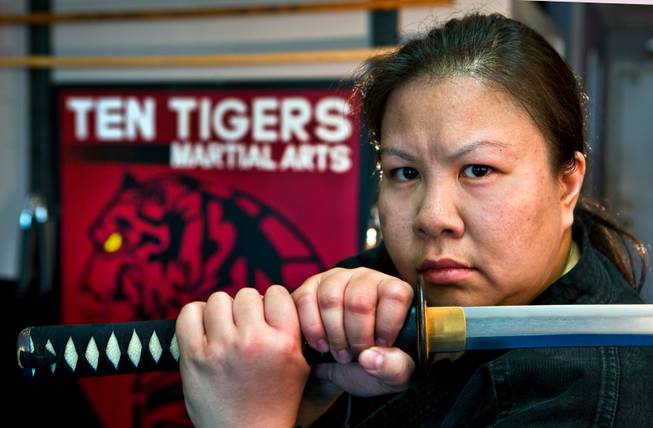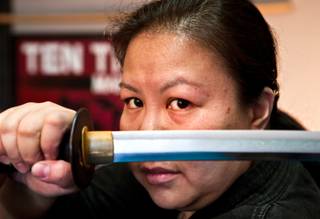
Uyen Vu, pictured here Wednesday, Sept. 23, 2015, is a local bodyguard trained in the use of many weapons and is often hired to keep celebrities, executives and others safe. She trains at Ten Tigers martial-arts studio keeping her skills sharp with hopes of not having to use them.
Monday, Sept. 28, 2015 | 2 a.m.
Uyen Vu is a local bodyguard, tasked with looking after performers who fly in for events such as the Billboard Music Awards and Electric Daisy Carnival.
She was born in Las Vegas and grew up taking martial arts classes and shooting guns in her backyard.
Her clients include Tyson Beckford, Alicia Keys and Bruno Mars.
How did you become a bodyguard?
It’s not the sort of industry where you can go to an agency and say, “Hi, this is my resume. I want to be a bodyguard!” I just fell into it.
I was introduced to a guy who needed drivers to pick up talent for the American Country Music Awards. When he found out I have a background in martial arts and firearms, he hired me to look after his clients. They come to Las Vegas for the awards shows, and now they request me personally.
People think this industry is really hard to get into, and it is — unless you know somebody.
Who are your most famous clients?
I’ve had one phenomenally famous client. I signed a nondisclosure agreement to keep his privacy, but I’ll give you a hint: He’s very popular with teens, and he’s a young man now in his twenties. At one point, his fans were known for having a particular kind of fever.
Other well-known clients include Bruno Mars, Alicia Keys, the Black Eyed Peas and the Far East Movement.
Are there any advantages to being a female bodyguard?
This used to be a male-dominated industry; it still is, but female agents are a hot commodity now. As a woman, you blend in more. If you’re dressed normally, you can pass for a personal assistant. You don’t have the stereotypical physical build people associate with bodyguards.
In the past, big guys were employed as visual deterrents, but times have changed and the industry is changing with it. It’s not just a man’s world anymore. A lot more women head up Fortune 500 companies, and women often prefer a female agent.
There was a women’s volleyball competition recently. They requested female agents because they said, “We don’t need a guy walking around our locker area.”
Then there are male clients who are more comfortable with female agents guarding their wives and children. It’s not just celebrities; company executives bring their families on business trips. So there’s a growing demand — but there aren’t enough female agents to meet it.
What’s deterring more women from becoming bodyguards?
It’s unknown territory for women. You’re the new kid on the block, and that can be very intimidating.
Speaking from experience, there aren’t enough women out there to give you guidance or point you in the right direction. Those of us who are out there tend to be guarded with our contacts. We don’t share that information because it didn’t come to me easily; why am I going to give it to someone else easily? You’re guarding your income, basically.
Do you ever have to say no to clients?
A lot of celebrities are used to being told yes to everything, but you need to know when to say no.
Some agents think: “I’m going to say yes to my client no matter what,” because they think that’s expected of them. They’re afraid of losing the client.
I tell my clients, “There are times when someone has got to say no, and I’ll be that person. I’m not questioning your authority, but you’re paying me to do a job. I have to make decisions that I feel are best for me to carry out my job.” If that means denying their requests, I’ll do it.
What sorts of things have you had to say no to?
If we’re driving back from rehearsals and my client wants to open the window and greet fans, there have been times when I’ve said, “That’s not possible.” The fans will turn into a frenzied mob, and while the client wants to do something well-meaning, they’re jeopardizing their safety. The fans aren’t malicious, but they get excited. It’s not a controlled environment, so it opens up the opportunity for things to go wrong.
Once I was driving a famous singer, and he rolled down the window to wave. The mob grabbed his arm, and we had to stop the vehicle. They wouldn’t let go, so he opened the door, thinking if he didn’t get out, he’d lose his arm. That created more frenzy. That’s the worst nightmare for us. I need to get the client out immediately. It got so crazy, he lost half his shirt and a fan got a hold of his watch.
Do people underestimate your ability as a bodyguard because you’re a woman?
I haven’t had too many issues. It boils down to how you carry yourself and whether you demand a presence.
There have been a few people in the entourage or on the security team who’ve wondered if I’m capable. Then I demonstrate my martial arts or we go to the gym or we go shooting, and they see I have valid skills.
I had an interview with a client in the jewelry industry. He wanted someone to protect him if things went bad. When I told him about my martial arts background, he pitted me against a guy on his team and said, “OK, let’s see how you handle yourself.” I showcased my skills, and it put the client’s mind at ease.
Do clients ever hit on you?
I see it all the time, celebrities sleeping with their staffers. Clients in a certain industry are used to being told yes to everything, and they lose reality of what’s acceptable.
Then there are people working in the industry who view the situation as an opportunity to make more money.
It takes two. It takes one person to say no and the other person to respect that. But it’s hard to walk away from these people. Staffers wonder: “If I turn them down, will this be my last chance to work in this industry? This person is so popular and famous, they make one call and I’ll never work again.”
This isn’t my only source of income, so it’s no loss to me; I can move on. It comes down to self-pride, too. I have a lot, so I’m adamant about boundaries.
Clients try to flirt with me, but I make a joke or act like I didn’t hear it. I still have to work with them, so the last thing I want is for them to feel uncomfortable. One client asked me if I stand out when I visit Vietnam, which is where my family is from. I said yes — my body is a lot thicker. He said, “That’s how I like ’em!”
I’ve driven one frontman of a rock band, and he was the nicest, most down-to-earth musician I’ve dealt with, very gracious and gentlemanly. He asked if I would like to go to dinner with him, and the fan in me was like: “I would love to!” But I had to say no. I said, “I am honored and flattered that you offered me a dinner invitation. Maybe another time, when I’m not working for you. While I’m working for you, I’d like to stay professional.” And he said, “I respect that.”
Do you carry a gun, and have you had to use it?
Most of the time, when I’m out on a job, I carry a firearm concealed underneath my clothing. I’ve never had to use it, and I think that comes down to how you carry yourself. If you communicate effectively, there’s no need to pull out a weapon. I feel that the minute you draw your weapon, you’ve failed in several steps along the way. To me, drawing a weapon is a last resort, and it shows you’ve failed to control the situation.
Have you had to use your martial arts skills?
I use martial arts every day, and people don’t realize it. Martial arts teaches me how to be aware of people, how to read their body language and their movements. When I’m on a job, I use martial arts to look for possible trouble. Say we’re in a club and people are getting rowdy four tables over. It’s my job to assess whether that could turn into a situation. Part of my training is to be aware of my surroundings, to assess the situation and to decide if we stay where we are or move to another spot.
Would you take a bullet for a client?
I don’t know about taking a bullet, but I’d buy them a burger!
I was looking after a band who performed at the Billboard Music Awards. It was their first time in Las Vegas, and they wanted to go to In-N-Out Burger.
We get there at 11:50 p.m., but the lady at the counter says they’re closed; the kitchen is getting cleaned and the grill is broken down. I said, “These guys just won an award. Can you make an exception?”
She gave us some fries but no burgers. I said, “Guys, I’m gonna make this happen for you.”
I went to a customer at the drive-thru and paid him $100 for his burgers. I went back to the guys, and they said, “You just got freakin’ robbed! You’re amazing!”
Then one notices there isn’t a burger for me. So he goes to the drive-thru and pays someone $40 so I can have a burger with them.
We’ve all seen ‘The Bodyguard.’ Have you ever fallen in love with a client?
I’ve been with my boyfriend for three years, and even he asks me: “You ever have crushes on these guys you work with?” I say no, because I don’t just see them at their best; I see them when they’re lazy and dirty, too.
What is the most challenging situation you’ve faced as a bodyguard?
Logistics can be the hardest thing for me. I have to get clients to a certain place at a certain time, but they’re not always great time managers. It’s nerve-wracking when I work with certain clients because they think, “Oh, everyone will wait for me.”
I had to take a well-known singer to perform at the White House Correspondents’ Dinner. We were pressed for time, then on the way there, she says she wants to stop at CVS. I’m thinking, there’s no way we’re going to make it on time. But you have to pick your battles.
Do you ever get starstruck?
No. Sometimes I don’t even know who they are. After I’ve worked with them, I Google them.
It’s funny because you see these people in a movie or music video, and you think back to when you were working with them, and you think, “Yeah, that’s typical. He always joked around.”
I once worked for Tyson Beckford at a race event, and when I see him on “America’s Next Top Model,” I’m like, “I know that guy, and he sucks on the race track!” So you have your own little window to a world that not everybody else gets to see.


Join the Discussion:
Check this out for a full explanation of our conversion to the LiveFyre commenting system and instructions on how to sign up for an account.
Full comments policy